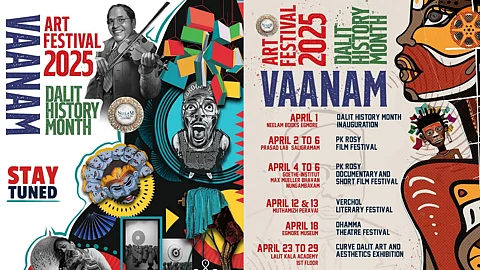
- HOMEGROWN WORLD
- #HGCREATORS
- #HGEXPLORE
- #HGVOICES
- #HGSHOP
- CAREERS
- ABOUT US
- CONTACT US

Dr. B.R. Ambedkar, one of India’s most influential social reformers, was a visionary leader and the principal architect of the Indian Constitution, Ambedkar dedicated his life to dismantling the oppressive caste system that had subjugated Dalits for centuries. In his honour, Dalit History Month is observed every April, the month he was born in. It's a month that provides space to revisit histories that have long been ignored, celebrate Dalit contributions to society, and foster conversations on caste and social justice.
This is the spirit that fuels Vaanam Art Festival, an ambitious, month-long cultural festival dedicated to Dalit narratives, aesthetics, and activism, launched by filmmaker Pa. Ranjith and the Neelam Cultural Centre. Ranjith was deeply inspired by a visit to the Smithsonian National Museum of African American History and Culture in the U.S., where he saw how Black history was archived, not just as a record of oppression but as a testament to cultural brilliance and survival. That experience made him realize how crucial it was to do the same for Dalit history in India which let to the formation of the festival.
What started as a modest film screening has now grown into a multi-disciplinary festival spanning cinema, literature, theatre, photography, and visual art. Vaanam brings together artists, thinkers, and performers who challenge dominant narratives and create space for Dalit voices to take center stage. The festival is structured across multiple venues, each focusing on different forms of storytelling and expression.
It all begins on April 1 at Neelam Books, Egmore, with an exhibition showcasing Tamil Dalit leaders whose contributions to cultural and political movements remain largely undocumented. The goal is to correct that historical erasure and to ensure that these figures are remembered not just in academic circles but in the larger public consciousness.
From April 2-6, the PK Rosy Film Festival at Prasad Lab, Saligramam presents a handpicked selection of films that explore caste, race, gender, and marginalization. This year’s lineup includes works by British director Steve McQueen (12 Years a Slave) and Senegalese filmmaker Ousmane Sembène (Black Girl), both of whom have masterfully captured the intersections of oppression and resistance in their storytelling. A special two-day showcase of documentaries and short films (April 4-6) will further examine these themes, spotlighting intersectionality and the fight for justice.
The literary segment, the Verchol Literary Festival, unfolds on April 12-13 at Muthamizh Peravai, where historians, activists, and writers will engage in thought-provoking discussions across 48 panels in five different languages. This year’s Verchol Dalit Literary Award has been presented to Tamil writer Bama, whose seminal work 'Karukku' remains one of the most powerful autobiographical accounts of living as a Dalit, Tamil, Christian woman in India.
On April 18, theatre takes the stage at Egmore Museum Theatre, with five plays — three in Tamil and two in other languages, bringing Dalit narratives to life through performance. Theatre has always been a space of radical storytelling, and this lineup promises to challenge perspectives and spark critical conversations.
The festival concludes with two major visual art showcases at Lalit Kala Akademi from April 23-29. The Curve Dalit Art and Aesthetics Exhibition will feature works that disrupt mainstream notions of beauty, power, and representation, while the Nitham Photo Exhibition will document everyday Dalit lives with an intimacy and authenticity that's rarely seen in popular media.
Why does Vaanam matter? Because even today, dominant narratives try to erase or dilute Dalit experiences — either by reducing them to mere suffering or pretending caste oppression is a thing of the past. But art has a way of making the invisible visible. It forces us to confront uncomfortable truths, to listen to voices that have been ignored, and to understand history not just as a collection of facts, but as a lived experience. At its core, Vaanam is about asserting identity, reclaiming space, and making sure Dalit stories are told through their own voices. These are stories of resilience, justice and liberation but also of celebration, something that is often sidelined in conversations about the community.
Follow Vaanam Art Festival here.
If you enjoyed reading this here's more from Homegrown:
'The Village Without A Science Teacher' Depicts Dalit Resilience Through A Children's Book
Sangham Radio: Inside The Dalit Women-Run Radio Station That's Reshaping Indian Media
Shailaja Paik's MacArthur Fellowship Is A Huge Victory For Dalit Resistance: Here's Why
